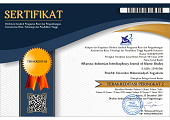Religion and Politics in Indonesia: The Role of Kyai in the 2024 Election, Case Study on Partai Kebangkitan Bangsa (PKB)
Abstract
Keywords
Full Text:
PDFReferences
“Abidin, M. Z. (2017). Ulama in Indonesian Urban Society: A View of Their Role and Position in the Change of Age. Jurnal THEOLOGIA, 28(2), 235 254. Https://Doi.Org/10.21580/Teo.2017.28.2.1863,” n.d.
Ali Anwar, NU AVONTURISM: Tracing the Roots of Nahdliyyin Political Interest-Conflicts (Bandung: Humaniora, 2004), p. 157, n.d.
“Arifianto, A. R. (2017). Practicing What It Preaches? Understanding the Contradictions between Pluralist Theology and Religious Intolerance within Indonesia’s Nahdlatul Ulama. Al- Jami’ah. 55(2), 241 264. Https://Doi.Org/10.14421/Ajis.2017.552.241-264,” n.d.
“Aswar, H. (n.d.). Pengaruh Ulama Dalam Politik Di Negara Muslim: Jurnal Ilmu Sosial Indonesia, 2(1), Maret 2015 Hal 85-102,” n.d.
Binder, L. (1960). Islamic Tradition and Politics: The Kijaji and the Alim. Comparative Studies in Society and History, 2(2), 250 256, n.d.
“Bush, R., & Fealy, G. (2014). The Political Decline of Traditional Ulama in Indonesia: The State, Umma and Nahdlatul Ulama. Asian Journal of Social Science, 42(5), 536 560. Https://Doi.Org/10.1163/15685314-04205004,” n.d.
Dhakiri, Muhammad Hanif Dan Kawan-Kawan. PKB Masa Depan. Jakarta: DPP Partai Kebangkitan Bangsa, 2006., n.d.
Dhofier, Zamakhsyari. 1999. The Pesantren Tradition: The Role of the Kyai in the Maintenance of Traditional Islam in Java. Tempe, Arizona: Program for Southeast Asian Studies, ASU, n.d.
Dirdjosanjoto, Pradjarta, Memelihara Umat: Kiai Pesantren-Kiai Langgar Di Jawa. Yogyakarta: LKiS, 2013., n.d.
Falikul Isbah, M. (2016). Examining the Socio-Economic Role of Islamic Boarding Schools (Pesantren) in Indonesia. School of Humanities and Social Sciences UNSW Canberra, n.d.
“Falikul Isbah, M. (2020). Pesantren in The Changing Indonesian Context: History and Current Developments. Qudus International Journal of Islamic Studies (QIJIS), 8(1), 2020. Https://Doi.Org/10.21043/Qijis.V8i1.5629,” n.d.
“Gaventa, John, ‘Finding The Spaces for Changes; A Power Analysis’, Ids (Institute of Development Studies) Bulletin, 37(6), (November 2006),” n.d.
Geertz, C. (1960). The Religion of Java. Massachusetts Institute of Technology, n.d.
Hairus Salim et al., Seven Sound Mining Machines (Yogyakarta: LKiS, 1999), p. 229, n.d.
Hamad, Ibnu . 2004, Konstruksi Realitas Politik Dalam Media Massa: Sebuah Study Critical Discourse Analysis Terhadap Berita –Berita Politik; Edisi 1, Jakarta: Granit, Hlm 100- 101, n.d.
Hammond, J.L. “The Politics of Benevolence: Revival Religion and American Voting Behaviour.” Ablex Publishing Corporation, 1979.
Horikoshi, Hiroko. 1976. “A Traditional Leader in a Time of Change: The ‘Kijaji’ and ‘Ulama’ in West Java.” Ph.D Thesis, The University of Illinois at Urbana-Champaign., n.d.
“Ismail, F. (2011). The Nahdlatul Ulama: Its Early History and Contribution to the Establishment of Indonesian State. Journal of Indonesian Islam, 5(2), 247 282. Https://Doi.Org/10.15642/JIIS.2011.5.2.247-282,” n.d.
Jay, R. R. (1969). Javanese Villagers: Social Relations in Rural Modjokuto. MIT Press, n.d.
Koirudin, Menuju Partai Advokasi, (Yogyakarta: Pustaka Tokoh Bangsa, 2005), Hlm. 1, n.d.
Noer, D. (1973). The Modernists Muslim Movement in Indonesian 1900 1942. Oxford University Press, n.d.
“Pepinsky, T. B., Liddle, R. W., & Mujani, S. (2012). Testing Islam’s Political Advantage: Evidence from Indonesia. American Journal of Political Science, 56(3), 584 600. Https://Doi.Org/10.1111/j.1540-5907.2011.00570.x,” n.d.
Peter L. Berger. (1966). The Social Construction of Reality: A Treatise in the Sociology of Knowledge. (George Simpson, American Sociological Review), n.d.
“Pribadi, Y. (2013). Religious Networks in Madura: Pesantren, Nahdlatul Ulama, and Kiai as the Core of Santri Culture. Al-Jami’ah: Journal of Islamic Studies, 51(1), 1. Https://Doi.Org/10.14421/Ajis.2013.511.1-32,” n.d.
Pribadi, Y. (2018). Islam, State and Society in Indonesia: Local Politics in Madura. Routledge. Http://Lib1.Org/_ads/35D9AC4C9B463056609C3D3C24056BB3, n.d.
Roger Simon, Gramsci’s Political Thought: An Introduction (London: Lawrence and Wishart, 1982) Hal 21, n.d.
“Salehudin, A. (2016). Konstruksi Jaringan Sosial Pesantren: Strategi Eksis Di Tengah Perubahan. Religi Jurnal Studi Agama-Agama, 10(2), 204,” n.d.
“Turmudi, E. (2008). Religion and Politics: A Study on Political Attitudes of Devout Muslims and the Role of the Kyai in Contemporary Java. Asian Journal of Social Science, 23(2), 18 41. Https://Doi.Org/10.1163/030382495x00105,” n.d.
Wahid, A. (1974). Pesantren Sebagai Subkultur. In D. Raharjo (Ed.), Pesantren dan Pembaharuan. LP3ES, n.d.
“Winarni, L. (2014). The Political Identity of Ulama in the 2014 Indonesian Presidential Election. Al-Jami’ah, 52(2), 257 269. Https://Doi.Org/10.14421/Ajis.2014.522.257-269,” n.d.
DOI: https://doi.org/10.18196/afkaruna.v20i1.18527
Refbacks
- There are currently no refbacks.
Copyright (c) 2024 Afkaruna: Indonesian Interdisciplinary Journal of Islamic Studies

This work is licensed under a Creative Commons Attribution-ShareAlike 4.0 International License.
Afkaruna: Indonesian Interdiciplinary Journal of Islamic Studies indexed by:













1.png)


